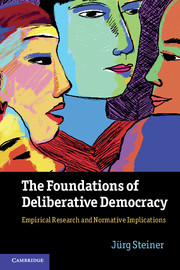Book contents
- Frontmatter
- Contents
- Figures
- Acknowledgments
- Introduction
- 1 Citizen participation in deliberation
- 2 Rationality and stories in deliberative justification
- 3 Common good and self-interest in deliberative justification
- 4 Respect in deliberation
- 5 Public openness of deliberation
- 6 Force of better argument in deliberation
- 7 Truthfulness in deliberation
- 8 Deliberation in the media and the Internet
- 9 Favorable conditions for deliberation
- 10 Favorable consequences of deliberation
- 11 The praxis of deliberation
- Appendix Newest version of Discourse Quality Index (DQI)
- Index
- References
2 - Rationality and stories in deliberative justification
Published online by Cambridge University Press: 05 August 2012
- Frontmatter
- Contents
- Figures
- Acknowledgments
- Introduction
- 1 Citizen participation in deliberation
- 2 Rationality and stories in deliberative justification
- 3 Common good and self-interest in deliberative justification
- 4 Respect in deliberation
- 5 Public openness of deliberation
- 6 Force of better argument in deliberation
- 7 Truthfulness in deliberation
- 8 Deliberation in the media and the Internet
- 9 Favorable conditions for deliberation
- 10 Favorable consequences of deliberation
- 11 The praxis of deliberation
- Appendix Newest version of Discourse Quality Index (DQI)
- Index
- References
Summary
According to deliberative theory, arguments need to be justified. This element of the theory has two aspects: the form and the substance of justification. This chapter deals with the form, the next chapter with the substance. With regard to the form, the key question is whether in deliberation only rational arguments are allowed or whether personal stories can also be used.
Normative controversies in the literature
In the Habermasian version of deliberation, arguments need to be justified in a rational, logical, and elaborate way. Assertions should be introduced and critically assessed through “the orderly exchange of information and reasons between parties.” The arguments must have intrinsic characteristics that make them compelling to others. “Communicative action refers to a process of argumentation in which those taking part justify their validity claims before an ideally expanded audience.” Jürgen Habermas, as a normative standard, explicitly excludes narratives and images as deliberative justification. This does not mean, however, as Michael A. Neblo points out, that Habermas excludes narratives and images as a practical matter or considers such discourses as necessarily inferior. There is controversy in the philosophical literature about this focus of Habermas on rationality in the justification of arguments. Theorists like Jane Mansbridge argue that testimonies about personal stories should also count as valid justifications. She justifies this position in the following way: “Stories can establish credibility, create empathy, and trigger a sense of injustice, all of which contribute directly or indirectly to justification.”
Information
- Type
- Chapter
- Information
- The Foundations of Deliberative DemocracyEmpirical Research and Normative Implications, pp. 57 - 87Publisher: Cambridge University PressPrint publication year: 2012
References
Accessibility standard: Unknown
Why this information is here
This section outlines the accessibility features of this content - including support for screen readers, full keyboard navigation and high-contrast display options. This may not be relevant for you.Accessibility Information
- 1
- Cited by
